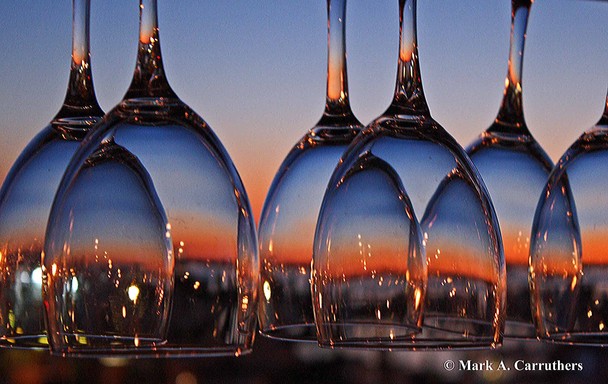FWP:
SETS == BASKIH; GENERATORS
TAMASHA: {8,1}
VEIL: {6,1}
WINE: {49,1}
Like {49,7}, this verse plays with the two possibilities of baskih . If we read it as 'to such an extent', as in (2a), we see line two as the cause and line one as the result. Because the wave of wine is so concerned with nurture and growth, it uses intoxication as a kind of cloak to screen itself while it pursues its real mission: studying-- and perhaps shaping or invigorating-- the (drinker's?) mind.
And if we read baskih as short for az baskih , 'although', as in (2b), then line two is read concessively: although the wave of wine is concerned with nurture and growth, nevertheless it is so entranced by the spectacle of the (drinker's?) mind that it simply veils itself within the cloak of intoxication and watches quietly, in fascination. On the double possibilities of baskih , see {13,5}. And let's not forget that the spectacle [tamaashaa] of the mind can have a mystical as well as a this-worldly sense; for more on this, see {8,1}.
Describing the wave of wine as 'having a mind/'head' for', sar-e , adds an extra source of pleasure. (Isn't it fortunate that the English idiom is so similar?) 'Head' of course has an affinity with 'mind', as Nazm points out; and the head and mind are the locus of intoxication. The effect is almost to suggest that the wave of wine too succumbs to a kind of intoxication. After all, the intoxication that the wave of wine uses as a 'curtain/guise' in the first line might perfectly well, grammatically speaking, be an intoxication felt by the wave of wine itself.
Then, there is the remarkable Persianized phrase nushv-o-namaa , meaning 'growth and increase'. From the Steingass definitions above, it's clear that both short vowels can alternate between u and a , while the uu can phonetically turn to v . And if nushv is rendered as nashv , it is indistinguishable from the related nashv that means 'intoxication' (see the definitions above)-- so that the verse achieves a spectacular feat of both wordplay and meaning-play.
The result is that this verse becomes an undecidable 'generator'-- since the imagery is so abstract and the abstractions so multivalent (who can tell who's really doing what to whom?), we really have to put the elements together for ourselves, and interpret them as we choose.
Our guest commentator Owen Cornwall is a grad student in Persian and Urdu at Columbia. His comments not only suggest additional lines of interpretation, but also reassure me that I'm not the only person made crazy by reading Ghalib.
Note for meter fans: The tashdiid that converts nashe into nashshe has been inserted for metrical purposes.

Nazm:
That is, the attention that wine paid to nurture and growth, turned into intoxication and rose into the head, and the words 'mind' and 'head' have a mutual affinity. (46)
== Nazm page 46